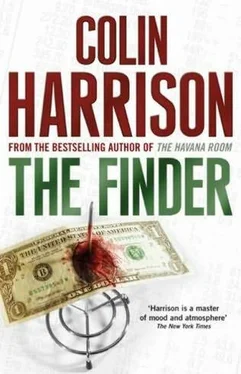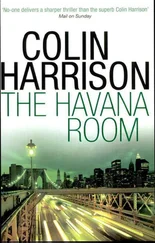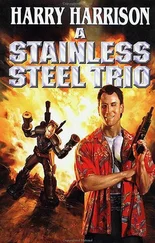Colin Harrison - The Finder
Здесь есть возможность читать онлайн «Colin Harrison - The Finder» весь текст электронной книги совершенно бесплатно (целиком полную версию без сокращений). В некоторых случаях можно слушать аудио, скачать через торрент в формате fb2 и присутствует краткое содержание. Жанр: Триллер, на английском языке. Описание произведения, (предисловие) а так же отзывы посетителей доступны на портале библиотеки ЛибКат.
- Название:The Finder
- Автор:
- Жанр:
- Год:неизвестен
- ISBN:нет данных
- Рейтинг книги:4 / 5. Голосов: 1
-
Избранное:Добавить в избранное
- Отзывы:
-
Ваша оценка:
- 80
- 1
- 2
- 3
- 4
- 5
The Finder: краткое содержание, описание и аннотация
Предлагаем к чтению аннотацию, описание, краткое содержание или предисловие (зависит от того, что написал сам автор книги «The Finder»). Если вы не нашли необходимую информацию о книге — напишите в комментариях, мы постараемся отыскать её.
The Finder — читать онлайн бесплатно полную книгу (весь текст) целиком
Ниже представлен текст книги, разбитый по страницам. Система сохранения места последней прочитанной страницы, позволяет с удобством читать онлайн бесплатно книгу «The Finder», без необходимости каждый раз заново искать на чём Вы остановились. Поставьте закладку, и сможете в любой момент перейти на страницу, на которой закончили чтение.
Интервал:
Закладка:
The night was warm, and thus the five-story building, one of a series of former factories on West Nineteenth Street, had become aromatized by the humidified essences of mold, dust, dead flies, cardboard, and dry-rotting wood-seemingly the layered odor of time itself expiring without end. The structure and six just like it had been built in the early part of the twentieth century; successive waves of real estate speculation had passed through and around these buildings, converting most to loft apartments, offices, showrooms, fancy restaurants that invariably failed, and the like. But a few remained unrenovated, and the reasons usually had to do with structural damage to the building, either from fire or water or, more often, because the building itself was a neglected holding long entangled in a lawsuit, estate matter, or family dispute.
Alone among the seven factories was the building where Jin Li sat up now in the half dawn, thinking she'd heard something. This building was notable for the implausibility of its continued existence; the place should have collapsed long ago. Why? All five floors were crammed with heavy useless matter, the creme de la creme of junk. The top floor was filled with claw-footed iron bathtubs and pedestal sinks, many of them tagged with information explaining their origin: "Hotel Edison, 1967 renovation," and so on. The fourth floor contained engine parts not only from vintage American cars and trucks of the 1930s, '40s, '50s, and '60s but, even more obscurely, utterly impossible-to-find motorcycles from early German, French, Italian, and British companies long defunct. The weight of these parts alone should have compromised the floor joists decades earlier. On the third floor could be found close to two million pairs of women's nylon stockings, still boxed, ranging in size from "petite" to "queen." The freight elevator was forever frozen on this floor, its bearings finally burnt out. Just to empty the building, either for demolition or renovation, would have required the replacement of the elevator, a considerable and demoralizing expense. Moving downward, the second floor contained thousands of boxes marked "Property of U.S. Department of Housing and Urban Development/New York City Regional Offices." These lost records documented the marginally successful attempt by the federal government to house hundreds of thousands of low-income residents in Queens, Brooklyn, and the Bronx during the economic downturn of the early 1970s. And finally, the ground floor was piled with spools of obsolete fiber-optic cable, bought when the city was rewiring itself in the speculative fever dream of the 1990s.
From time to time people asked about renting cheap office space in the building and these inquiries were fielded by the custodian, a Russian man with strange, faded Cyrillic tattoos on his knuckles who did little more than sweep up the sidewalk once a week and remove flyers advertising art-house movies and new rock bands. He handed the prospective renters copies of the keys to the steel door to the building, told them to use the stairwell, and to go in the middle of the day for the power was off and no lights worked. "And please you drop key in mailbox." But whether the key was returned was a matter of character-as was whether the Russian custodian noticed. He generally didn't, for he noticed very little in life now. He followed the rankings of his favorite European soccer teams, he drank not vodka but four bottle-inches of Sambuca each night from the same crusty glass, and if asked whether he really cared about who came to and went from the cramped and dirty building on Nineteenth Street, he would have admitted he cared not at all.
Returning to that building by way of the stairwell to the second floor, one could easily discover that Jin Li had pushed around some of the boxes of federal housing records to create a small room within them; in this dim space was all she carried with her: an inflatable mattress, a fat wad of cash, her Chinese passport, a small green suitcase containing not only her blue CorpServe uniform but also one nice cotton dress (why she'd hastily packed this, she had no idea), a bag of toiletries, a cell phone now carefully turned off, and a Styrofoam ice box. On the mattress lay Jin Li, looking at the ceiling, thinking again she had heard something downstairs.
What? Anything?
She listened. Nothing- maybe.
At least she had planned ahead, Jin Li told herself, keeping the key that the Russian had given her when she'd come looking for cheap office space for CorpServe a few months earlier. The place had been all wrong for her purposes, but its obscurity and neglect had struck her as potentially useful in other circumstances. In China nowadays buildings like this were soon demolished and someone like her brother would put up a cheap apartment building three times higher. The Russian had never asked for the key back and so she'd kept it-in her purse and in the back of her mind as a place she could hide. No one would want to rent space in a firetrap that had no electricity or heat. But still she was anxious. She could have been followed-that was possible. The men at the beach in the big trucks had followed her, after all, had been looking for her and her alone. She was sure. The Mexican girls didn't know anything. How did the men identify Jin Li? She had been so careful. Did they plan on coming back? Were they still looking for her?
And then there was her brother, Chen. As soon as she'd called from a pay phone, he jumped on the first flight he could find to New York City and started asking around for her, making things worse. Usually it took forever to get a visa to visit the United States, but Chen knew people, was owed money and favors by men and women all over Shanghai and even in Beijing. He'd panicked when she'd called him-not over her, but that his clever international criminal enterprise was endangered. "What did you do?" he'd screamed at her in their family's Mandarin dialect. "How did you fuck up?"
It was a question Jin Li couldn't quite answer, though she'd thought about it constantly. CorpServe had been carefully created by Chen with one devious purpose in mind, but in order to appear to be a conventional company it contained three divisions, two of them legitimate business units operating in the open. The first division cleaned New York City offices at conventional rates, bidding for contracts with management companies and corporate operations people. This part of the company ran daily crews in thirty-two buildings, the number naturally fluctuating as contracts were won or lost upon expiration. The crews dutifully cleaned, collected, and hauled dry waste-paper, cardboard boxes, printed matter, coffee cups, and so on-down to the service bays where the refuse was loaded and removed by one of the city's private carting companies, another distinct business so cutthroat and residually mobbed up that one entered it only at great risk and with even greater connections. It would be a good two generations before anyone with a Chinese name operated such a company in midtown Manhattan.
The second part of CorpServe, which serviced seventeen buildings, both collected dry waste and provided onsite "chain-of-custody" document destruction. The company owned nine forty-four-foot mobile units, each of which was divided into a shredding equipment area and a payload space for storage of the shredded materials. Each unit could handle up to eight thousand pounds of paper per hour and could shred not just boxes, files, paper clips, and rubber bands but also CDs, DVDs, identity cards, hard drives, even uniforms. CorpServe provided shredding as high as the level five standard, used for commercially sensitive and top secret documents, which mandated a maximum particle size of 0.8? 12 millimeters. The mobile units generated their own elec trical power, and everything was shredded and baled in one simple operation, the bales then trucked away in volume to paper mills where the paper and extraneous matter were separated by particle-weight blowers and recycled. Each mobile CorpServe shredding unit was equipped with a New York State-certified scale that weighed the material to be shredded and came with a complete video system that recorded the actual shredding. After each night's work, the CorpServe technician provided the building services manager a copy of the scale tickets and a video of the shredding. This was usually a big selling point, but in truth these tickets and videos soon piled up and were eventually shredded along with everything else. Document destruction, just like office cleaning, was an incredibly boring business. There was no tangible product except a blur of confettied paper. The customer paid to make something into nothing, literally for the creation of emptiness. The mobile shredders were loud; no one wanted to watch them for very long. On long-term contracts, client oversight eroded away then vanished. The uniformed CorpServe crews-all of them Mexican, Guatemalan, and Chinese women-unfailingly showed up on time and did their jobs. Trying to get a handhold on America, the workers generally felt lucky to be employed, spoke English poorly, and affected a submissive mien, rarely even speaking to office personnel-not out of a quest for efficiency but on the assumption that no one had anything to say to them. Which was true. Faceless, nameless, they were more or less invisible.
Читать дальшеИнтервал:
Закладка:
Похожие книги на «The Finder»
Представляем Вашему вниманию похожие книги на «The Finder» списком для выбора. Мы отобрали схожую по названию и смыслу литературу в надежде предоставить читателям больше вариантов отыскать новые, интересные, ещё непрочитанные произведения.
Обсуждение, отзывы о книге «The Finder» и просто собственные мнения читателей. Оставьте ваши комментарии, напишите, что Вы думаете о произведении, его смысле или главных героях. Укажите что конкретно понравилось, а что нет, и почему Вы так считаете.












